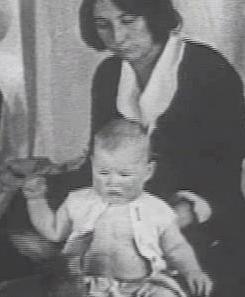Rosalie Rayner facts for kids
Quick facts for kids
Rosalie Rayner
|
|
|---|---|

Rosalie Rayner with Little Albert
|
|
| Born | 25 September 1898 Baltimore |
| Died | 18 June 1935 Norwalk |
| Nationality | American |
| Occupation | Psychologist |
| Known for | Little Albert experiment |
Rosalie Alberta Rayner (September 25, 1898 – June 18, 1935) was a research psychologist, and the assistant and later wife of Johns Hopkins University psychology professor John B. Watson, with whom she carried out the famous Little Albert experiment. Rayner studied at Vassar College and Johns Hopkins University. During her career, she published articles about child development and familial bonds both with Watson and independently.
Early life
Rayner was born in Baltimore, Maryland on September 25, 1898. Her father and grandfather, Albert William Rayner and William Solomon Rayner, respectively, were successful businessmen. Her mother, Rebecca Selner Rayner, and father had one other daughter, Evelyn. Albert William Rayner made a living dealing with railroads, mining, and shipbuilding. The Rayner family also supported Johns Hopkins University, to which they contributed $10,000 toward research. Rayner's uncle, Isidor Rayner, was also a prominent public figure. Isidor worked as a senator in Maryland and managed public inquiries into the sinking of the Titanic, in addition to serving as Attorney General of Maryland for four years.
Education
Rosalie Rayner continued her education at Vassar College in New York, where she graduated with a Bachelor of Arts degree in 1919. At Vassar, she studied alongside Mary Cover Jones, who became a prominent psychologist with a focus on lifetime development. Upon graduation, Rayner enrolled at Johns Hopkins University with the intention of earning a graduate degree in psychology. She was hired as an assistant to John B. Watson, who is best known for pioneering the approach to behaviorism. Behaviorism is a term that Watson introduced into the field of psychology to describe the goal of predicting and controlling observable behaviors.
Research career
During her time at Johns Hopkins University, Rayner conducted research on alcohol in the body alongside her behaviorist research with Watson. She and Watson aimed to make family life reflect an empirical environment, based on the belief that behaviors were not hardwired at birth, but instead were acquired through conditioning.
Rayner and Watson claimed to have studied over 500 children, with the Little Albert experiment being their only attempt at a psychological experiment (it would not be categorised as an experiment today). The basis of their study was conditioning a 9-month old baby, referred to as "Albert", to fear a white rat, which had previously been a neutral stimulus. Textbooks often claim that the fear was generalized to other white, furry stimuli, such as fur coats, rabbits, and a Santa Claus mask, but the rabbit was brown and the strength and duration of the fear do not seem impressive in retrospect (and to careful viewers of the film that Watson made). The results of the study were published in the Journal of Experimental Psychology. Despite its prominence, the "Little Albert" study would be deemed highly unethical by modern standards.
Personal life
Rayner's collaboration with Watson developed into an affair, which resulted in him divorcing his previous wife, Mary Ickes. The divorce became publicly bitter. Watson's love letters to Rayner were published in newspapers. Due to the scandal, Watson was forced to leave academia; however, his relationship with Rayner continued. Rayner also left the university before completing her degree and the two married on December 31, 1920. They moved to Connecticut, where Watson worked for the advertising agency J. Walter Thompson. The couple had two sons together, William and James.
Death
Rayner unexpectedly died on June 18, 1935 in Norwalk Hospital in Connecticut. She had contracted dysentery from eating tainted fruit. Watson was troubled with her death and never remarried. In later years, their two sons reflected on their childhood as they both developed depression in adulthood. Their son William died. James stated that his father's principles on behaviorism in their strict parenting practices inhibited his and his brother's ability to effectively deal with human emotion, adding that it undermined their self-esteem later in life.
See also
 In Spanish: Rosalie Rayner para niños
In Spanish: Rosalie Rayner para niños

